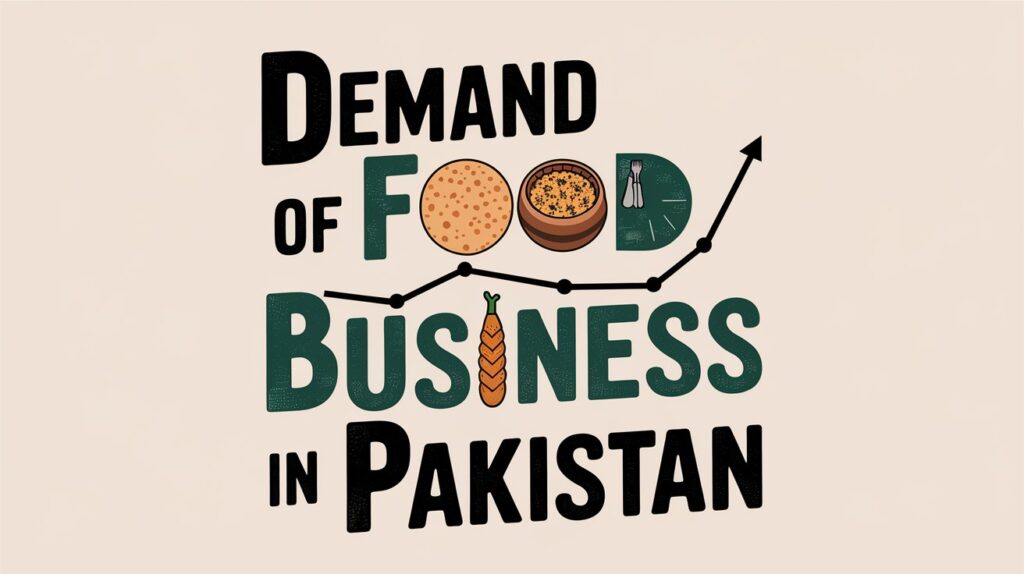In Pakistan people eat and enjoy every type of food like Chines food, Italian foods, Fast food, homemade food and restaurant dishes which that food business is profitable business in Pakistan. In this article we’ll guide you for starting food brand in Pakistan at low investment.
Demand of Food Business in Pakistan

The food business in Pakistan has always been booming and in the last few years it has grown even more. Population growth in Pakistan shows the demand for food business in Pakistan.
The success of various business models such as restaurants, fast food chains, home kitchens, and food delivery services in rural and urban areas is showing an increasing demand for food business. Online food services are booming after Covid-19.
Steps to start food business in Pakistan
1. Conduct Market Research
Market research is the foundation of any successful business. Investigate local food trends, target demographics, customer preferences, and the competitive landscape. Identify gaps in the market where your product could stand out. For example, if there’s demand for organic or healthy food options in your area, you could leverage this trend by offering unique, health-focused dishes.
2. Choose a Niche and Define Your Business Model
Selecting a niche and a clear business model is crucial. Decide whether you want to open a restaurant, food truck, online food delivery, or catering service. Some popular niches include fast food, organic or healthy foods, traditional Pakistani dishes, and international cuisines. A well-defined business model will help streamline your operations and cater to your target audience effectively.
3. Develop a Business Plan
A solid business plan acts as a roadmap for your food business. Outline your business goals, target market, budget, menu, marketing strategy, and revenue projections. Your business plan should also cover potential challenges and risks, such as food quality standards and pricing strategies, as well as contingency plans to handle unforeseen circumstances.
4. Register Your Business and Obtain Necessary Licenses
To operate legally, register your food business with the relevant local authorities. Obtain a National Tax Number (NTN) and ensure you’re compliant with all local regulations. Additionally, apply for a food license from the Punjab Food Authority (PFA) or Sindh Food Authority (SFA), depending on your business location. Compliance with health and safety regulations is crucial to avoid legal complications and build customer trust.
5. Secure Funding and Resources

Determine the financial requirements to launch your business, including rent, utilities, equipment, staff salaries, and marketing expenses. You can fund your venture through personal savings, loans, or investor support. Make sure you allocate a portion of your budget for unexpected costs, especially during the initial months.
6. Set Up Your Supply Chain and Inventory Management
Building a reliable supply chain is essential for maintaining food quality and consistency. Find trusted suppliers for raw materials, packaging, and other essentials. Implement an efficient inventory management system to avoid stock shortages and reduce wastage. Quality control at each step of the process is important to maintain standards.
7. Create a Marketing Strategy
A strong marketing strategy is essential to attract customers. Use social media platforms, such as Facebook, Instagram, and TikTok, to showcase your food, engage with potential customers, and offer promotions. Additionally, consider creating a website and registering on popular food delivery apps like Foodpanda to reach a wider audience.
Also Read:
How Pakistani Restaurants Can Use SEO to Attract More Customers
8. Hire and Train Staff
For a successful food business, well-trained staff are essential. Hire individuals skilled in food preparation, customer service, and management. Invest in staff training to maintain hygiene standards, improve service quality, and enhance customer satisfaction.
9. Focus on Customer Feedback and Improvement
After launching, gather customer feedback to understand your business’s strengths and areas for improvement. Use customer suggestions to improve your menu, service quality, or ambiance. Adapting based on customer needs will help build a loyal customer base and encourage positive word-of-mouth.
8 Best and Profitable Food Business Ideas

Pakistan’s food industry is booming, providing ample opportunities for entrepreneurs seeking profitable business ideas. With a growing population, increasing demand for diverse cuisines, and a vibrant food culture, starting a food business in Pakistan can be a lucrative venture. Here are some of the best and profitable food business ideas suited for the Pakistani market:
1. Fast Food Restaurant
Fast food is immensely popular across Pakistan, especially among the younger population. Opening a fast-food restaurant that serves affordable burgers, pizzas, and shawarmas can attract a broad customer base. The initial investment can vary, but once established, this business can offer high profit margins, particularly in urban areas.
2. Catering Service
Catering is a highly demanded service for weddings, corporate events, and family gatherings in Pakistan. Starting a catering service requires good culinary skills, a strong menu, and quality presentation. The business is scalable, as you can start with small events and grow with experience and customer feedback.
3. Bakery and Confectionery
Bakeries that offer fresh bread, cakes, and pastries are always in demand. With trends like customized cakes and unique flavors, a bakery business can be quite profitable. Setting up a bakery in a busy area or providing online ordering options can attract regular customers and special orders for events.
4. Home-Based Food Delivery
Many people are increasingly seeking homemade, healthy meal options delivered to their doorstep. Starting a home-based food delivery service allows you to operate with low overhead costs while targeting office workers and students. This business is flexible and can be managed through social media and delivery apps.
5. Organic Food Shop
With rising health awareness, organic food is becoming more popular in Pakistan. Setting up an organic food shop that sells fresh vegetables, fruits, and grains can cater to health-conscious customers. If direct store costs are high, an online shop for organic products is another profitable model with relatively low investment.
6. Street Food Stall
Street food is a major attraction in Pakistan, and popular options include samosas, golgappas, and chaat. Starting a food stall in a high-traffic area requires minimal investment and allows for high turnover. This business is great for beginners and can expand into a chain with the right strategy.
7. Frozen Food Supply
Frozen foods, including parathas, kebabs, and samosas, are widely consumed by busy households. Starting a frozen food supply business allows you to produce and supply ready-to-cook items to supermarkets or directly to consumers. This business can grow quickly as more people look for convenient food options.
8. Juice and Smoothie Bar
Juice and smoothie bars are popular, particularly during summer. Offering fresh, healthy drinks in bustling marketplaces or near offices and gyms can attract health-conscious customers. This business has high-profit potential as customers are willing to pay a premium for quality ingredients.
Conclusion

Starting a food business in Pakistan presents a promising opportunity for entrepreneurs, given the increasing demand for diverse and quality food options. With careful planning, understanding market demand, and selecting profitable food business ideas, you can establish a strong presence in this dynamic industry.
By following the outlined steps on how to start, conducting thorough research, and catering to local preferences, aspiring business owners can position themselves for success. Whether you aim to launch a café, a food delivery service, or a specialty food shop, the food industry in Pakistan offers a wide array of profitable avenues to explore. Take the leap with a well-thought-out plan and watch your business thrive in Pakistan’s ever-growing food market.


